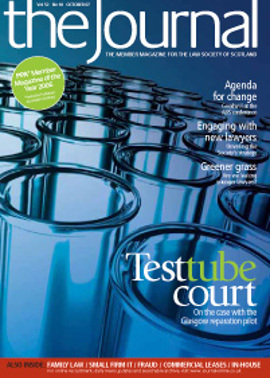Pub games reborn

Gambling law has been completely transformed. The impact of the Gambling Act 2005 has been far reaching, as it affects every form of gambling except the National Lottery and spread betting – but you would be forgiven for not realising this, as much of the press coverage has been given over to banner headlines of super casinos, with the occasional flutter of stories on poker.
The reality for the licensing practitioner is much more complicated, and many lawyers across Scotland are now struggling to deal with a ream of information from local authorities, the Scottish Government and the Gambling Commission. Matters are further complicated by the difficult relationship between the Gambling Act and the respective Scottish Licensing Acts. For the majority of licensing lawyers, the key areas of note are the changes to gaming machines; poker; non-commercial gaming; remote gaming; and the creation of licences for “family entertainment centres” (FECs) and “adult gaming centres” (AGCs).
Gaming machines
Any licensed premises with a permit under the old Act can continue to operate those machines as before. Existing permits were automatically converted on 1 September 2007; however action must be taken prior to the expiry of the existing permit. If the operator has two machines or less, all that is required is a letter to the appropriate licensing board with a one-off fee, and they then benefit from an “automatic entitlement” under the new system which does not expire or require further fees. If the operator has (or wishes to have) three or more machines, an application for the new licensed premises gaming machine permit (LPGMP) is required. Alcohol licensed premises may have either category C or D machines (those offering up to a maximum jackpot of £35).
For club premises, similar provisions apply. Current operators with Part II or Part III permissions can continue to operate, but prior to the expiry of their existing permit must make an application to the relevant licensing board. Part II operators must apply for a club gaming permit, and Part III operators for a club machine permit. These permits allow the use of higher class machines (up to category B £500 jackpot machines), and the club gaming permit also allows no-limits equal chance gaming. Lastly, all machine operators (pubs and clubs) must adhere to a code of practice.
Poker
Poker is now legal on any licensed premises with a bar, although certain limits must be adhered to. For alcohol licensed premises, there is a maximum stake per game of £5 per person. This limit rises to £10 for club premises; and if a club gaming permit is held for members’ clubs and miners’ welfare institutes, there is no limit.
Non-commercial gaming
Themed gambling nights, conducted for charitable purposes, are now legal under the new Act. Many operators wishing to have “race nights” or “Las Vegas nights” under the old system fell foul of local licensing sergeants who frowned on the practice. Now operators can charge for entry or participation in such events, offer cash prizes and deduct reasonable expenses, but again there are limits to be observed.
Remote gaming
The rise of internet gambling may have some implications for licensed premises providing online facilities. Domestic and private use PCs are exempt (thus allowing such activities in hotel rooms to escape regulation), but computers adapted to link to poker or other gambling sites may well fall to be considered as “gaming machines”, the provision of which requires to be licensed under the new Act.
FECs and AGCs
Arcade areas in premises such as bowling alleys or snooker halls may well avail themselves of FEC or AGC licences (the difference being that AGCs are for over 18s only, but can offer higher jackpot machines). However my understanding is that if the principal activity of the premises is not the provision of machines, there should be no need for either of these licences. However, certain operators may wish to set aside an area to take advantage of the machines such licences allow, and to complicate matters it is a mandatory condition of both the FEC and AGC licence that no alcohol can be sold or consumed: this may mean having to “de-license” that part of the premises set aside.
With such a glut of new provisions, it is a safe bet that there will be many confused operators out there.
Stephen J McGowan, of Hill Brown Solicitors and author of “Gaming in Pubs & Clubs: The New Law”, to be published shortly by Scottish Licensing Law & Practice (www.sllp.co.uk). He is also the tutor for Central Law Training’s newly revised paralegal course in licensing law.
In this issue
- Advocacy in mediation
- Your voice will count
- Does justice need fixing?
- A case for trial?
- The tide for change
- New lawyers for all
- Leaving the profession
- Three proposals
- Options ahead on standards
- Know the need, know the cure
- The file at your fingertips
- Fraud: making your strategy work
- A wider view
- Pub games reborn
- Working with OSCR
- Goal to Leeds
- "We're all doomed" - or are we?
- Website reviews
- Book reviews
- Out of my depth?
- Court bars in-house privilege
- Leases: the war is over?
- ARTL picks up speed






